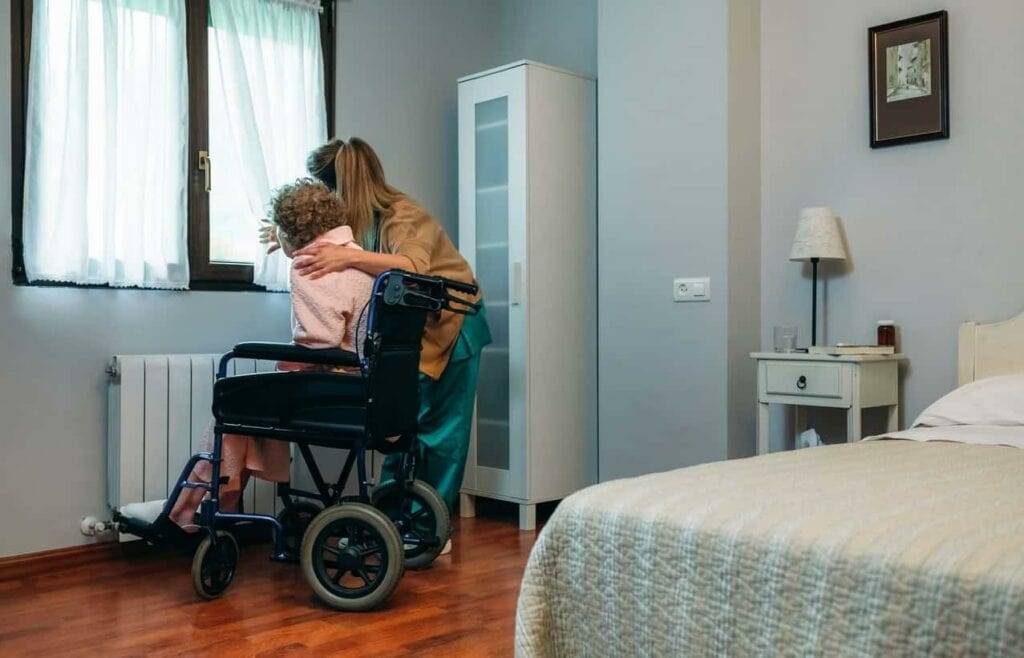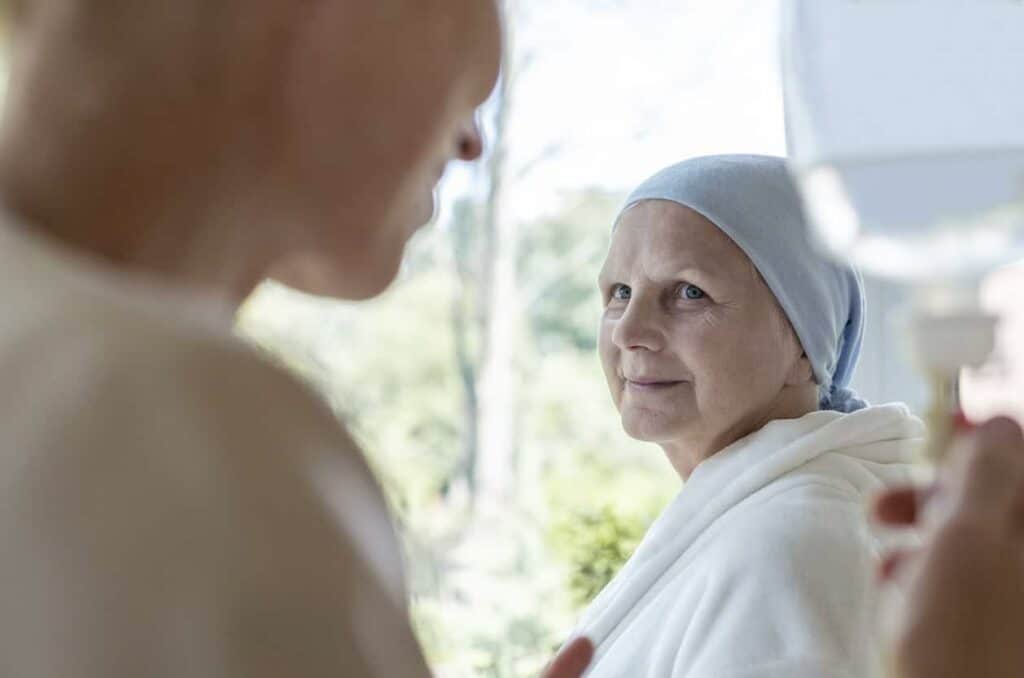
Dealing with cancer is difficult for everyone involved — patients and family alike. There may come a point when the patient stops responding to treatment, or treatment doesn’t help as much.
In this case, hospice care may be the right option for your loved one to live the remaining days of their life in comfort and love.
If you or your loved one is battling with end-stage cancer, read on to learn more about hospice for cancer patients, and how to get started with this specialized care.
Understanding Hospice Care for Cancer Patients
Hospice care focuses on the patient’s quality of life as they approach the end of life. It provides holistic care for cancer patients by addressing their physical, emotional, and spiritual needs.
Hospice care for cancer also addresses the needs of the family; helping them navigate the complexities of taking care of a loved one who is nearing death.
Keep in mind that hospice doesn’t seek to hasten death, it only tries to enhance the quality of life of the patient and their families in those final weeks or months.
When your loved one opt-in for hospice, they consent to forgo curative treatment, and instead focus on holistic comfort care. However, they can still receive medications to help with symptoms such as nausea, constipation, or pain.
Studies show that hospice plays an important role in helping patients and their families come out of the trauma of advanced stages of cancer.
When is hospice needed for cancer patients? Let’s find out.
When is it Time to Consider Hospice for Cancer Patients?
Typically, end-of-life care begins when a patient has a prognosis of 6 months or less to live.
Most patients and families wait until the final weeks before enrolling in hospice. However, research shows that families and patients who use hospice services report a higher quality of life than those who don’t.

While the patient and family can choose hospice, only a doctor can clinically determine the prognosis of your loved one’s cancer.
When your loved one’s doctor has given the prognosis of 6 months or less to live, it means the cancer is at the most advanced stage.
Signs indicating the need for hospice care
Some signs to look out for to determine that it may be time to begin hospice include:
- Cancer is no longer responding to curative treatment
- Your loved one is in the advanced stage of cancer
- Your loved one has lost a lot of weight
- They want to stop treatment as it’s no longer effective
- The burden of treatment on your loved one or the family outweighs the benefits
You, your loved or their doctor may suggest hospice. If your loved one’s physician suggests hospice, this doesn’t mean they have given up or there is no hope. It just means the time has come to prioritize comfort care over curative treatment.
Benefits of hospice care for cancer
The benefits of hospice care services cut across patients and their families. The hospice care team works together to help you and your loved one overcome the stress of the illness, and enhance your quality of life.

Benefits for patients
Often, we hear questions such as “What does hospice do for cancer patients?”
Hospice offers the following:
- Pain management: one of the goals of hospice is to promote comfort care ensuring the patient lives with less pain and suffering. Your loved one will be given medications to control their pain and help with other symptoms such as difficulty breathing, constipation, or nausea.
- Emotional support: Dealing with cancer, and realizing treatments have stopped working, and that you’re nearing the end of life can be difficult to take in. Your loved one might find it difficult to cope with their emotions. They could be angry, depressed, afraid, or hopeless. Hospice guides them during this emotional time, giving them the right coping strategies and tools.
- Spiritual support: Approaching death may get us thinking about life, purpose, and the afterlife. The hospice team helps your loved one address these questions they may have. They also encourage and facilitate any ritual, prayer, or ceremonial that your loved one holds dear or deems necessary.
- Advanced care planning: Involves making decisions about the medical care your loved one would want to receive when they cannot speak for themselves. This ensures their wishes are respected. Advanced care planning includes a living will, a durable power of attorney, and advance directives.
- Enhanced quality of life: hospice ensures that the last days of your loved one’s life are full and meaningful. In these final months, they can reflect, make peace, and create meaningful moments for their family to cherish even after they are gone.
Benefits for family and loved ones
Hospice care benefits family members in the following ways:
- Coordination of care: The hospice team manages the care for your loved one, and ensures everyone is on the same page. Regular meetings are held to discuss your loved one’s condition, and what to expect. During such times, family members can air their views and ask questions about the dying process.
- Respite care: this is short-term care to relieve family caregivers of their responsibilities giving them time to relax and recharge. This is helpful for cancer patients who receive hospice care at home
- Bereavement care: Coping with the death of a loved one is not easy, and anticipating their death can be worse. The hospice team provides bereavement or grief counseling to help you and your family come to terms with the situation, and provide support to help you cope. With hospice, families can access bereavement care up to 13 months after the death of their loved one.
- Practical assistance: The Hospice teams can assist with practical matters such as coordinating medications, medical equipment, and home healthcare services. They can also guide navigating complex healthcare systems and accessing community resources.
Where To Receive Cancer Hospice Care?
Depending on the wishes of your loved one and their health condition, hospice care can be received in a variety of places.
The Home
Hospice care at home for cancer patients is an option for most people because they can live their final days in a familiar environment, surrounded by those they love.

If your loved one wishes to receive hospice care at home, your hospice care team will visit them regularly to check on them. You may need to hire the services of a hospice caregiver to assist with bathing, eating, meal preparation, and household chores. Or, you can be the sole caregiver for your loved one depending on your schedule.
It’s helpful to know that if you’re your loved one’s caregiver, you can ask the hospice team for respite care to enable you to take a break.
Assisted living homes
If your loved one is unable to receive hospice at home, assisted living homes are a great option. Your loved one resides in a home-like environment where they are taken care of by caregivers who are like family.
In Amy’s Eden Assisted Homes, our caregivers provide compassionate care filled with love. For us, it’s more than just caregiving. It’s about being a part of your loved one’s life, family, and traditions.
Hospital/Hospice Centers
Your loved one may receive inpatient hospice care in a hospital or hospice care center if they need constant care and attention that cannot be provided at home. They may also be eligible to go home after a while to continue hospice care at home.
Who Pays For Hospice Services?
Medicare, Medicaid, and most private insurance pay for hospice services.
Medicare-covered hospice for cancer patients
Most hospice patients are eligible for Medicare which covers hospice costs and services with little to no copays.
Often, what is not covered by Medicare Part A, may be covered by Part B and C.
Medicare typically covers:
- The hospice team
- Medications
- Home medical equipment
- Respite care
- Routine home care
- Inpatient care
- Bereavement care
Medicare will not cover curative treatment or costs for room fees or assisted living.

To qualify for Medicare-covered hospice, you must:
- Have Medicare Part A
- Your hospice doctor and primary doctor will certify that you or your loved one is terminally ill, and has 6 months or less to live
- You consent to receive comfort care instead of curative treatment
- You sign a statement choosing hospice care instead of other Medicare-covered treatments for your health condition.
To learn more about Medicare for hospice, you can talk to a Medicare official by calling 1-800-MEDICARE (1-800-633-4227).
Medicaid
Medicaid also covers hospice services for terminally ill individuals. Coverage includes:
- Nursing
- Medical social services
- Physician services
- Counseling services to the patient, family, and caregivers
- Short-term inpatient care
- Medical appliances and supplies
- Homemaker services
- Therapy (physical, occupational, and speech)
To begin, individuals will sign an election statement with a particular hospice; the hospice provider must also receive a physician certification that the patient is terminally ill and requires hospice.
Private insurance
If your loved one doesn’t have public insurance, most private health insurance covers hospice and end-of-life care services. However, the extent of coverage may vary from provider to provider.
Ask your loved one’s provider about coverage so you know what to expect.
Choosing A Hospice Provider
Once you decide to use hospice care and your loved one has been certified to have 6 months or less, the next step is to choose a hospice care provider that can provide the quality care you need.
To find hospice services:
- Talk to your primary care provider; they may be able to recommend local hospice providers for cancer patients near you
- Use the National Hospice and Palliative Care Organization (NHPCO) directory to find a provider
- Utilize the care compare tool by the Centers for Medicare and Medicaid (CMS). Simply enter your ZIP Code to begin the search
- Ask local clinics and hospitals for recommendations
- Ask friends and family, some may have used hospice services for their loved ones in the past

Questions to ask
When considering a provider, here are some questions to ascertain if that provider will be the right fit for your loved one.
- What services does your hospice provide beyond medical care?
- How does your hospice handle emergencies or after-hours situations?
- Can you explain the roles of the hospice team members and how they support families?
- What bereavement services do you offer to families after a patient’s passing?
- How does your hospice involve families in care planning and decision-making?
- What are the criteria for admission into your hospice program?
- Can you explain the costs associated with your hospice care and what insurance covers?
- How do you ensure continuity of care and coordination with other healthcare providers?
- What training and qualifications do your staff members have?
- How do you tailor care plans to meet the unique needs and preferences of your loved one and family?
- Will you provide training to family caregivers?
- If we are unhappy with some aspects of the care provided, who can we contact and how?
Only move forward with a hospice provider if they answer your questions satisfactorily. Be sure to look up reviews and testimonials to see what others are saying.
FAQs about hospice for cancer patients
Who makes up the hospice care team?
The hospice care team comprises professionals including doctors, nurses, aides, social workers, chaplains, volunteers, and grief counselors. They all work together to provide holistic care for cancer patients and their families
How long will my loved one stay in hospice?
This depends on your loved one’s prognosis and health condition. Typically, to qualify for hospice, your loved one would have been certified to live for 6 months or less.
What happens if my loved one’s condition improves while under hospice care?

In some cases, patients can stay longer than 6 months. However, they have to be recertified for another 6 months. In other cases, your loved one may get better during hospice, decide to opt-out, and resume curative treatment.
Can hospice care be provided in conjunction with other treatments or therapies?
Hospice focuses on comfort care rather than curative treatments. However, patients can receive hospice care alongside other therapies such as chemotherapy or radiation if the primary goal is to manage symptoms and improve quality of life.
When do you call hospice for cancer?
You can begin hospice for cancer when your loved one is experiencing declining health despite treatment, has 6 months or less, wants to focus on comfort rather than treatment, or has had recurrent emergency visits.
How is hospice different from palliative care?
Hospice care is specifically tailored for patients with a terminal illness and a prognosis of six months or less if the disease runs its normal course. The primary aim of hospice care is to enhance comfort, manage symptoms, and provide emotional and spiritual support during the end-of-life phase.
In contrast, palliative care is available at any stage of a serious illness and focuses on improving quality of life by addressing physical, emotional, social, and spiritual needs, often alongside curative treatments.
Takeaway
It can be challenging to watch a terminally ill loved one near the end of life. However, hospice can make their final months fulfilling by providing comfort care and improving their quality of life.
If you’re looking for end-of-life care services for your beloved senior, Amy’s Eden Senior Care is the go-to provider in Carson City, Reno, and surrounding areas.
Reach out to us today to learn more about our services, and see how we can make the final moments of your loved one filled with peace, happiness, and comfort.




